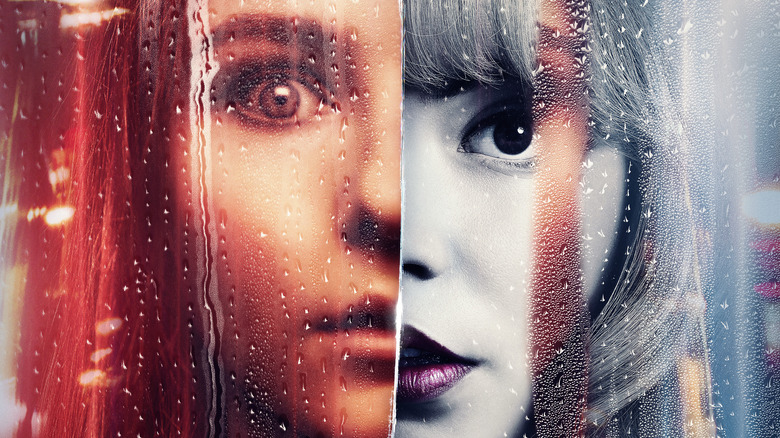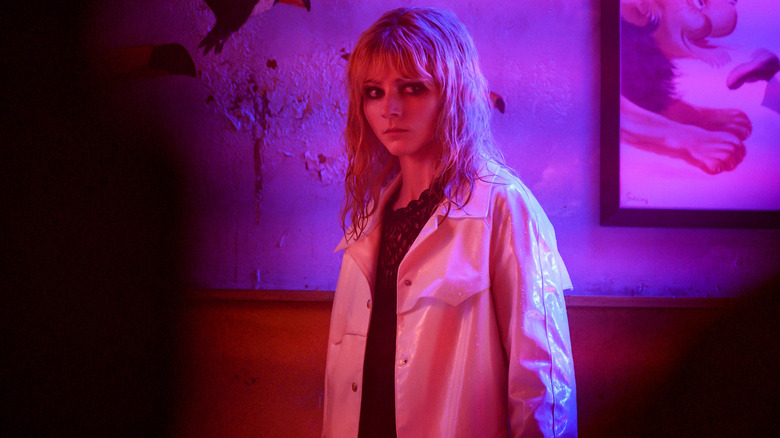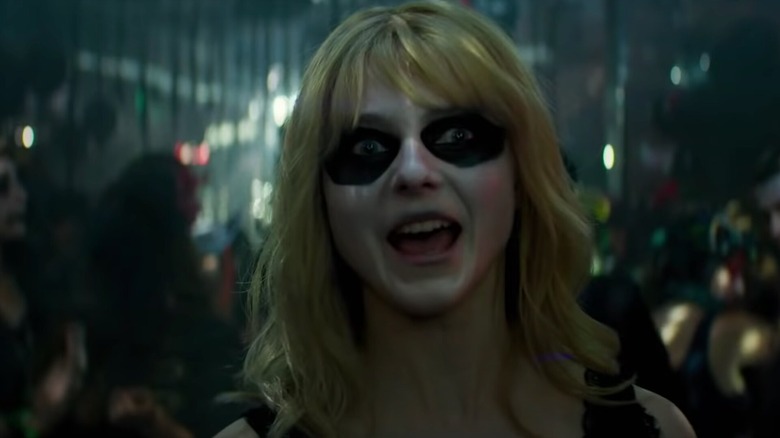Last Night In Soho Review: The Sixties Sense
In interviews, Edgar Wright has joked that "Last Night in Soho," his first foray into horror, is his Brexit film. Even for a director who has parodied small-minded Englishness in films such as "Hot Fuzz" and "The World's End," it may seem like a bit of a reach to have such a specific political reading of a time-traveling slasher set in the heart of London. But he's not exactly inaccurate. In the broadest possible sense, he's told a story where a character faces grim consequences after falling for a romanticized view of the past — a return to a Britain that never was, the lies she willingly believed in only serving to further haunt her in the present day. If that isn't the perfect summary of why so many Brits voted for Brexit and its aftermath, then what is? It's an allegory broad enough to go over the heads of viewers outside the UK who will still enjoy the shocks at face value, although this isn't the only time he tries to address a serious issue within the narrative. And unfortunately, the way he mishandles that won't be as easy to overlook.
In the weeks since seeing Wright's latest, it has only further soured in my mind, all thanks to a screenplay (co-written with "1917" scribe Krysty Wilson-Cairns) that struggles to balance the violent thrills with a more serious social commentary, and it only grows more conflicted in how to handle it the further it gets to the finish line. In addition to being loosely about Brexit, the film directly addresses difficult themes of sexual assault, but clumsily deals with this weighty topic in ways that feel conservative in some places, and deeply regressive in others. It's nothing short of a disappointment to see a great director make his first big misstep the second he finally steps out of his comfort zone.
Supernatural in the City
Wright has stated that, for him and Wilson-Cairns, the film is a lot more autobiographical than meets the eye. Just like our protagonist Eloise (Thomasin McKenzie), he moved from the West of England to Soho in his younger years, his awareness of pop culture almost entirely informed by the '60s records his parents would listen to while he was growing up. We meet her as she moves to London after being accepted to study at the London College of Fashion, and finds herself immediately outcast by her new classmates, specifically the aspiring model Jocasta (Synnøve Karlsen). Moving out almost as soon as she moves in, she uproots to a quaint flat elsewhere in Soho, owned by landlady Ms Collins (Diana Rigg, in her final screen performance — the film is also dedicated to her). Happy to be in her own space, she throws on the old vinyl records she's taken with her, and is immediately transported back to London in the 1960s.
The visualization of time travel is effectively simple, a gateway to a fantastical dreamworld emerging whenever Eloise hides under the covers — there is mercifully no time machine or dense lore needed to explain it away. Arriving in the '60s, she finds herself embodying aspiring singer Sandie (Anya Taylor-Joy), who straight away captures the attention of manager and promoter Jack (Matt Smith). Their romance initially enraptures Eloise, who finds herself shunning the outside world to return to this dreamscape night after night, even changing her physical appearance to look more like the wannabe starlet at the centre of these visions. But suddenly, these take a turn for the nightmarish, she witnesses bloodshed, and the ghosts of the era start manifesting themselves in every waking moment of the present.
The aspects of autobiography don't exactly leap out from the screen, but Wright has highlighted a kinship between Eloise and his mother, who was known to experience supernatural presences while he was growing up. This is a detail many viewers may prefer to know going in, as repeated references to the protagonist's sixth sense, and visions of her dead mother, never properly find their footing within the narrative. Even when introduced in the opening moments, this remains a MacGuffin in search of a plot point. However, this big omission when it comes to defining a crucial aspect of her character, which will likely leave many assuming this is a poor taste depiction of a mental health condition (admittedly, a characteristic Eloise has in common with several more iconic scream queens), is by far the least of the film's problems.
Prior to the film's Venice Film Festival premiere, the director penned an open letter to critics asking them not to spoil anything after Eloise takes her first journey back in time — something which the trailers have already done, in an extensive fashion. But with some secrets still intact, I will be as vague as possible as I talk around the issues. The spoiler-phobic can safely read on.
Lost in London
Soho is a district that, as Wright has described in interviews, was both the heart of the entertainment industry, and the criminal underworld in the '60s, the two making uneasy bedfellows. If you've seen any film about the dark heart of showbiz, you'll know already that Sandie's career trajectory doesn't lead her toward the stage, but the simplified manner in which it depicts this arc proves to be startlingly regressive. A much-needed commentary on the sexism and assault inherent in the industry very quickly transforms into a more conservative criticism of sex work, rehashing age-old ideas that all those in the industry are victims, and all those who pay for sex are inherently evil. The manner in which Sandie is forced into prostitution is genuinely horrifying, but Wright and Wilson-Cairns suggest that this is the universal experience for all sex workers — a harmful oversimplification, not to mention a cheap way of addressing a very serious topic like assault, to the modern eye.
This is complicated even further via a scene involving the character of John (Michael Ajao), Eloise's charming but distractingly one-dimensional love interest. The first night she sees violent, murderous visions is when the pair are having sex; he pulls away, but she keeps screaming, his character effectively being made to be viewed as a guy wrongfully accused of sexual assault by those on the other side of the door. Already deeply misguided (the fact this unwarranted narrative punishment occurs to the only character of color in the film should not go unnoticed), unpacking the ramifications of this scene proves far too complex for Wright and Wilson-Cairns. The very next day, John acts like nothing has happened, and this is never mentioned again. So much of "Last Night in Soho" leaves a sour aftertaste, but nothing is quite as confounding as that sequence of events around the halfway point, which stands as an awfully misjudged counterpoint to their commentary on sexual violence elsewhere.
Wright's screenplays are usually ingenious in the way they foreshadow outlandish events. Despite being a decade in the making, his latest can often come off as lazy in this regard, especially when contrasting the past with the present. Without going too far into specifics, the audience are led to believe that a certain character in the '60s scenes has an equally menacing counterpart in the modern day. I can't help but feel this misdirect would be harder to see through had Wright not cast a distractingly famous performer to appear in a very brief, and seemingly inconsequential, scene in the period sequences.
By the end, there's a disappointing realization that the film was at its strongest in its opening hour, when most reliant on Wright's familiar tics; an infectious pop soundtrack, creative sight gags, and reliably witty dialogue filled with puns and wordplay. If I have failed to mention this up until this point, it's because I haven't seen a film fall off a cliff in the second half this spectacularly in quite some time.
For me, there will be no film more disappointing than "Last Night in Soho" this year. It may be more personal to Wright than meets the eye, but it's hard to judge as anything other than a clumsy attempt to mix his innate genre sensibilities with distressing subject matter — the thrills of the former only serving to over-sensationalize the latter.


